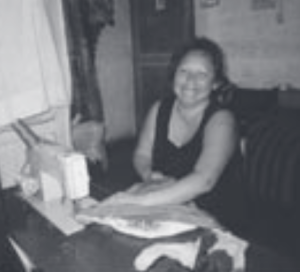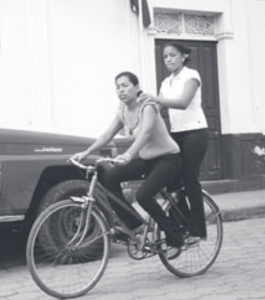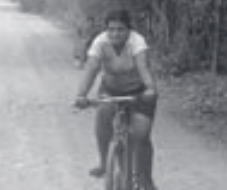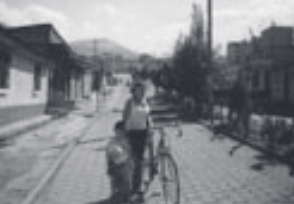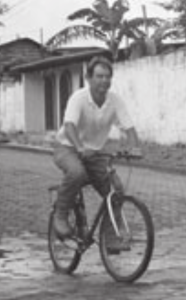30-year-old Brenda Griselda Carranza Pérez lives in a small village in Chimaltenango, Guatemala. Working as a seamstress sewing by hand, she was barely making enough to live. FIDESMA, our partner in Guatemala, imported 41 sewing machines from Pedals for Progress in the last three years. Brenda considers herself extremely lucky that she was one of the persons who received one of the sewing machines. She paid about $43 US for the machine and has in 7 months paid for the machine many times over. In fact, working five hours a day on the machine she now makes enough money to support herself and is putting money aside with the hopes of purchasing a second machine. This is just one machine of hundreds shipped by P4P that has allowed a person to help themselves.
Carmen Castillo is a 37-year-old single mother of three young girls for whom she is the sole provider. She and her daughters live in Nandaime, Nicaragua, where Carmen’s job as a maid brings 1000 cordobas of income into their household each month. Recently, in order to pay for an urgent increase in living expenses, Carmen sold the bicycle she had been using for 2 years and acquired (from one of her employers) a replacement bicycle – a high-value mountain bike at the bargain price of 650 cordobas.
She rides this bicycle every day – minimally 4 miles round trip from her house in the “campo” (city-outskirts) to the center of town. Since the mountain bike is so strong, Carmen can carry a second person to see a nurse/doctor or to the marketplace; or she can transport firewood from the hillsides for cooking. While the physical effort Carmen exerts (the surtax of owning two wheels!) is significant, cycling gets her to work reliably, assures her the security of regular income, saves 6 cordobas daily bus fare, allows her to take things into the market to sell and makes her feel healthier. When her bike breaks down, occasionally, Carmen goes to a local mechanic – but not for a flat tire. She felt it necessary to learn how to patch inner tubes herself; thus, she can save additional bus fare!
Getting her first professional job as an elementary school teacher was a great step forward for 22-year-old Paola Roxana Juárez Garcia. Her great joy became concern when she realized that the school to which she was assigned was 5 km away from her home and public transportation did not exist. She went to FIDESMA because she knew there were bicycles available and was able to purchase a sturdy mountain bike for $15. Monday through Friday she uses her bike to commute back and forth to work and on weekends uses the bike for shopping and meeting with friends.
Sandra del Carmen Hernández has owned her bicycle since she was 10 years old. Her father bought it for her originally to go back and forth to school; however, during the last six years there is no member of her family who has not had the occasion to use it. In fact it is often the commuting vehicle of the whole family – dropping off and picking up people much as Americans do in a minivan. This minivan, though, is a mountain bike that someone pedals. CESTA, which obtained this bike from P4P, has imported over 13,000 of our bikes since 1995.
Rosendo Cuadrais is a 65-year-old security guard at the Villa Hermosa in Diramba, Nicaragua. For seven years he has used a mountain bike (purchased for 750 cordobas) to go from his house to his work – bicycling at least 7 miles daily. Fortunately, with the climate in Rivas, he can use the bike every day all year round.
While commuting efficiently to his job is important (he could feed himself on the cost of daily bus fare), Carmen says the most important reason for having a mountain bike is to use it for getting out into the countryside (where the roads are dirt) to visit his daughters, lend it to them when possible and to go shopping in the market without wasting money on the bus. Thus, Rosendo’s bike is in use constantly. He likes the mountain bike’s versatility and sturdiness. He uses it not only to bring back firewood from the hillsides for cooking, but also to transport him rapidly all around the city and countryside with minimal expense. Because he doesn’t have many tools (and wouldn’t know how to use them if he did), whenever maintenance of the bike becomes an issue, he brings it to a mechanic in one of the many small shops in the area.

